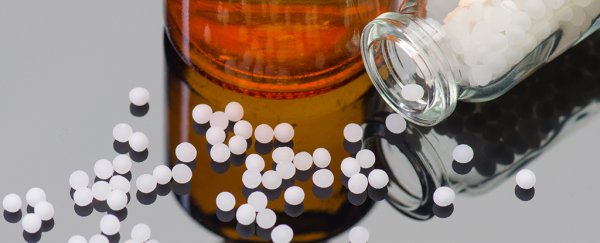When a 38-year-old man with chronic liver disease found his condition was suddenly getting worse, he swore to his attending doctors he was absolutely teetotal.
Baffled, they hunted in vain for signs of infection, drug use, and even pesticides. The cause finally became clear following a conversation with the patient and his family: alcohol was to blame after all, but not because the man was drinking.
Instead, for the past month the man had been taking homeopathic remedies, ostensibly to deal with high levels of a blood waste product called bilirubin found in his blood.
In this case, the excess bilirubin was attributed to Gilbert's syndrome, which is a completely benign genetic condition that typically doesn't need treatment at all. But, as his doctors note in BMJ Case Reports, the obese patient did also have liver scarring due to fatty liver disease.
Homeopathy is often overlooked when doctors are investigating drug interactions, since the harmless-looking sugar pills and tinctures usually contain no active substance capable of exerting an effect on the patient's body.
On balance, science finds there's zero difference between a homeopathic remedy and the diluent it's based on, although that doesn't stop people turning to the practice for help, often in times of desperation.
In the case of this patient, it's not clear why he sought help from a homeopath; Gilbert's syndrome doesn't usually require treatment, but nevertheless he was sent home to start a course of liquid formulations and tablets.
Two weeks into his new treatment, the patient claimed he was feeling drowsy and slurring his speech, as if intoxicated. The liquid formulation was reduced and the number of tablets increased.
A further two weeks passed, and things started to get serious: his eyes yellowed, his urine darkened, and his legs began to swell. Repeat liver tests revealed a spike in his bilirubin roughly ten times above normal levels, with other liver enzymes also elevated.
All signs were pointing to an acute form of hepatitis commonly associated with alcohol binges.
With the patient adamant he hadn't touched a drop, pathologists looked for every type of viral hepatitis, as well as a range of other viral infections, heavy metals in the bloodstream, and a series of drugs, pesticides, insecticides and anabolic steroids.
It wasn't until the patient revealed his homeopathy use that the cause of his agony became apparent.
Homeopathic remedies might not have actual therapeutic ingredients dissolved in them, but when the solvent is 18 percent alcohol, as it was in this case, a patient with chronic liver disease might as well be taking shots of sherry.
Despite starting the patient on a range of treatments and referring him to a liver transplant centre for further management, the damage to his liver was done. Tragically, just one month and 12 days after initially showing up at the clinic, the man developed multiple organ failure and passed away.
The general view that alternative medicines are a safe option is slowly being challenged around the globe. The US Food and Drug Administration has sought to tighten regulations in recent years, for example, while the UK's National Health Service no longer funds homeopathic prescriptions.
Treated as distinct from evidence-based medicines, alternative remedies not only lack the same level of scrutiny and regulation, their use is often not discussed with doctors.
That means any treatment, including those as harmless as a sugar pill dosed with a tincture of alcohol, can for some people produce complications when combined with existing conditions and medications.
As the doctors point out in their case study, "At risk patients and the general population need to be educated regarding the fact that complementary and alternative medications are not without side-effects."
This research was published in BMJ Case Reports.
